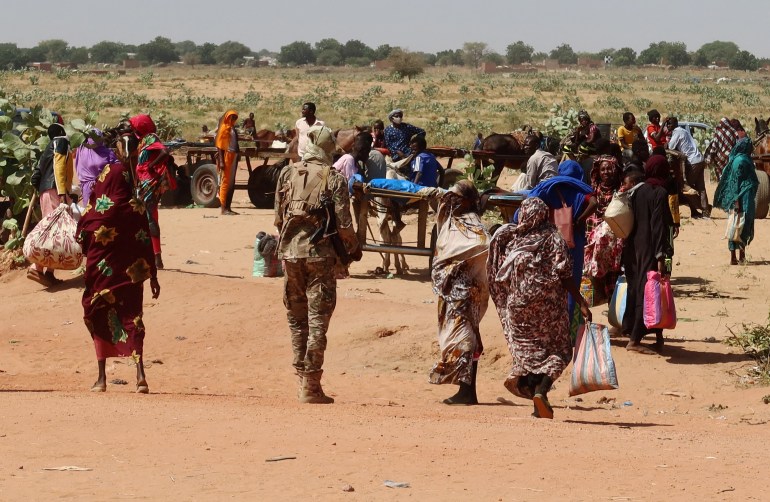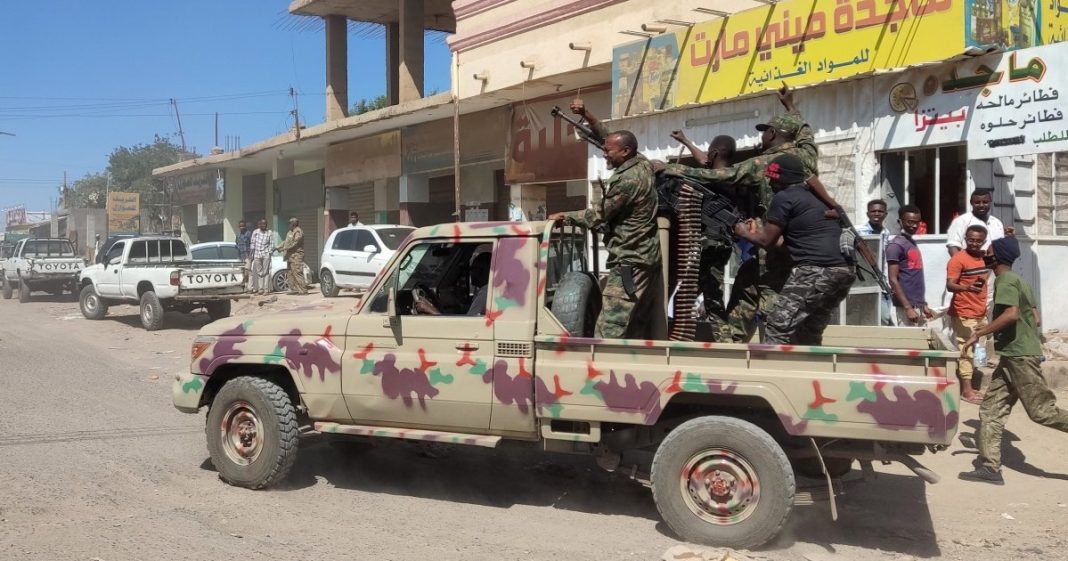In December, Osman Arbab*, 24, and his younger brother were on a bus just outside Atbara, Sudan, when military intelligence stopped it and asked which of the passengers were from Darfur or Kordofan.
The two men are originally from Kordofan, even though they have not lived there for years, and found themselves bundled up with all the other young men on the bus who were from the two places.
The military intelligence officers told them all they were accused of spying for the Rapid Support Forces (RSF) paramilitary group and took them to a facility in Atbara in northeastern Sudan.
For six days, Arbab and his brother were beaten with sticks to try to extract confessions from them. They would be taken in together so each man could see and hear what was happening to his brother.
When the sticks did not work, their interrogators on day seven connected them to electric cables and started shocking them.
Arbab remembers watching his brother scream, helpless to do anything for him.
‘We’re not going to make it out’
“My brother [has diabetes], and I remember thinking that we’re not going to make it out of here,” Arbab told Al Jazeera.
“I was thinking: ‘My brother will die. … They’re going to kill us.’”

The army seems to be cracking down on people from regions where its rivals, the RSF, have some support, accusing them of being RSF “sleeper cells”.
The people taken in these dragnets across the country have been subjected to enforced disappearances and often torture, and little to no evidence against them is ever presented
At least dozens have been extrajudicially executed, according to videos verified by Al Jazeera.
Survivors and local monitors said security forces are mainly targeting people who originate from Kordofan in southern Sudan or Darfur in the west, which are seen as RSF strongholds. In some regions, civilians belonging to nomadic “Arab” tribes may be more vulnerable because the RSF recruits heavily from their communities.
Arbab thought he was going to die, too – if not from torture then from the terrible conditions in detention. He said his room was freezing, that he was given little water and he was forced to pay for his food. After surviving for 12 days, an officer solicited a bribe for his release.
“I gave $50 for myself and $50 for my brother, and they finally let us go the next morning,” Arbab told Al Jazeera.
Even army soldiers have been killed if anyone suspects that they have loyalties to the RSF. In Kordofan, most army battalions are made up of local “non-Arab” Nubians and local “Arabs”.
There are broad perceptions that “Arab” army officers secretly support the RSF, raising fears that the military could fracture along ethnic lines.
This month, the army reportedly executed 10 soldiers from nomadic “Arab” tribes in Dilling, South Kordofan, accusing them of collaborating with the RSF.
One of the soldiers was tied to a ladder and hung by his feet as crowds cheered for his execution, according to a video on social media that Al Jazeera verified. A photo of the aftermath shows the victim appeared to have been tortured to death. Local monitors and activists described the killing as a “crucifixion”.
Ethnic tension
“In South Kordofan, there has always been tension based on ethnic and tribal lines, even in the army,” said Hafiz Mohamad, a Sudanese researcher from South Kordofan.
Mohamad told Al Jazeera that in Sudan’s previous civil wars, it was Nuba soldiers and civilians who were accused of collaborating with mainly “non-Arab” rebel groups. Now, things have changed and “Arabs” are being targeted.
Ethnic tensions are soaring across northern and eastern Sudan, too.
On December 16, the army withdrew from Sudan’s second-largest city, Wad Madani after the RSF captured it.
As a final act, the military executed dozens of civilians who belonged to “Arab” and “non-Arab” tribes from Darfur, according to a video shared by pro-army accounts that Al Jazeera verified.

Al Jazeera sent messages to army spokesperson Nabil Abdullah asking him about the summary executions and allegations of arbitrary arrests and torture based on ethnic grounds but received no response by the time of publication.
Mohamad Osman, Sudan researcher for Human Rights Watch (HRW), told Al Jazeera that the army’s decision to arm civilians could lead to more ethnic-based killings.
He said the army is fuelling ethnic divisions to drive recruitment, giving the RSF a pretext to retaliate along ethnic lines as it has done in Darfur. On Friday, videos surfacing across social media showed RSF fighters detaining and killing unarmed men in Gezira state, which they captured entirely after seizing Wad Madani, its capital, last month.
Many of the victims were reportedly accused of cooperating with the army.
“Who is a civilian and who is a combatant is going to become blurry,” Osman told Al Jazeera. “And involving civilians as combatants … will help the discourse of the RSF when they claim that they don’t attack civilians but fighters.”
Counterproductive
In the early 2000s, thousands of people fled Darfur to northern and eastern states. At the time, “Arab” tribal militias – which were supported by the army and later repackaged as the RSF – targeted civilians based on ethnicity.
According to HRW, they committed summary executions against “non-Arabs” and burned their villages to the ground, often assuming they supported rebel groups. Two decades later, the army is accusing survivors of these attacks of supporting the RSF.
Muzan Mabrooka*, a young woman from a “non-Arab” tribe in Darfur, said she and her male colleague were arrested and accused of being RSF spies in June.
They were stopped in Gadarif, a state in eastern Sudan, and taken to a detention centre and interrogated. Her male colleague was severely beaten, Mabrooka said.

“When they finished investigating me, they told me to leave. But I claimed that my colleague was my husband, and I wasn’t leaving him. I feared they would really hurt him if I left,” Mabrooka told Al Jazeera.
Mabrooka’s colleague was eventually let go that day, but two of her friends were later abducted and tortured in Kassala, a state in eastern Sudan. She said they were also released but are too afraid to speak about what happened to them. Many others remain missing, according to local monitors.
Jehanne Henry, a human rights expert on Sudan and a non-resident fellow at the Middle East Institute, said the army is doing itself a disservice by targeting people based on ethnicity.
“Military intelligence could be driving people to look for other allies – if not RSF, then maybe groups that get along with RSF – which is very dangerous politically speaking for the Sudanese armed forces,” Henry said. “The army has just committed one blunder after another.”
Mabrooka added that civilians from Kordofan and Darfur are always assumed to be conspiring against the army, irrespective of the context. She criticised the army for claiming to protect civilians while subjecting many to grave violations.
“It doesn’t matter who supported or didn’t support the RSF in the past,” Mabrooka told Al Jazeera. “All tribes [from Darfur and Kordofan] are being targeted now.”
* Names have been changed to protect individuals.
Note to Readers: The terms “Arab” and “non-Arab” are slippery labels in many regions in Sudan. Both communities are Black and Muslim and have inter-married for centuries. The labels mostly denote communal ways of life. “Arabs” are traditionally pastoralists and camel herders, while “non-Arabs” are sedentary farmers.







